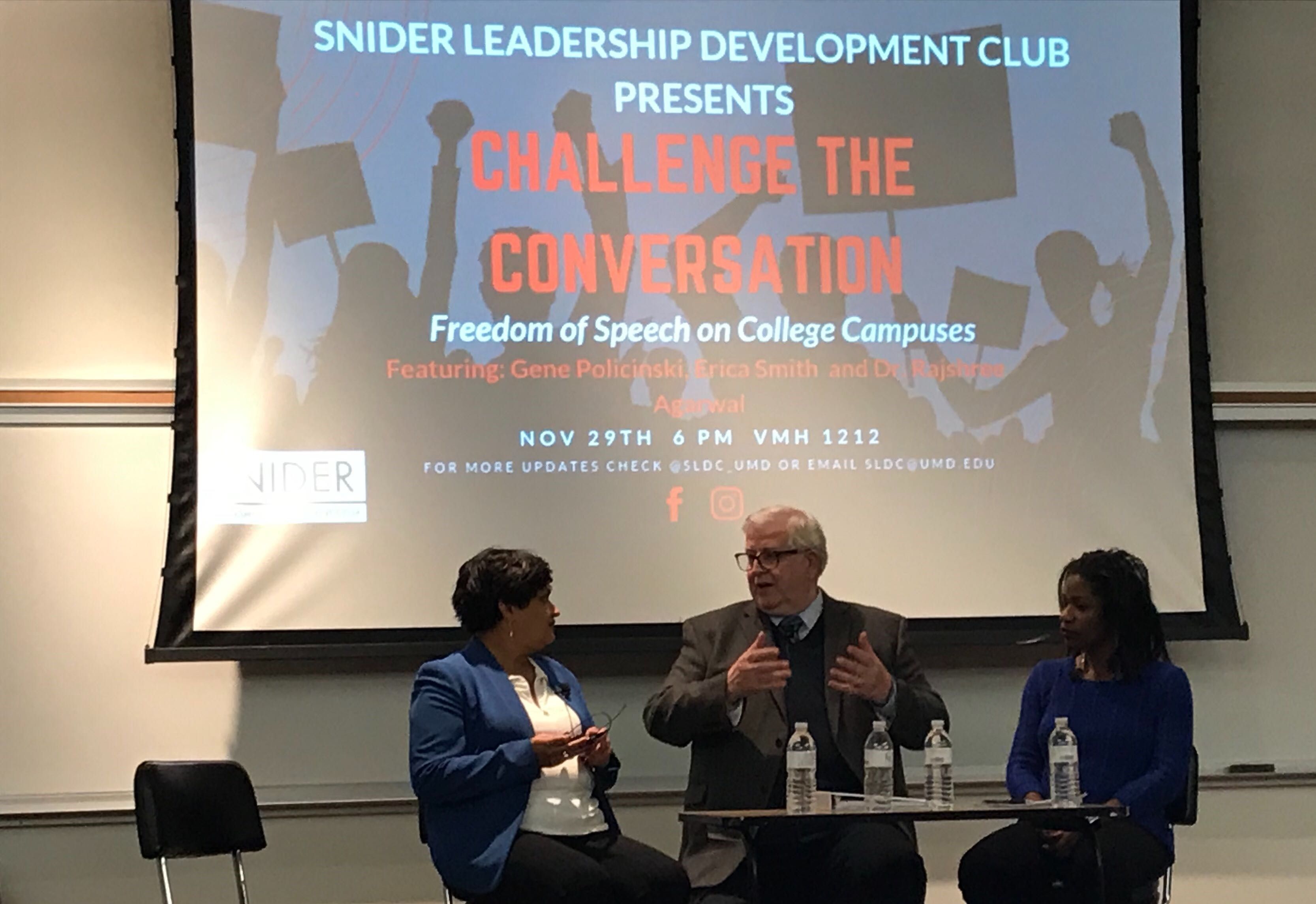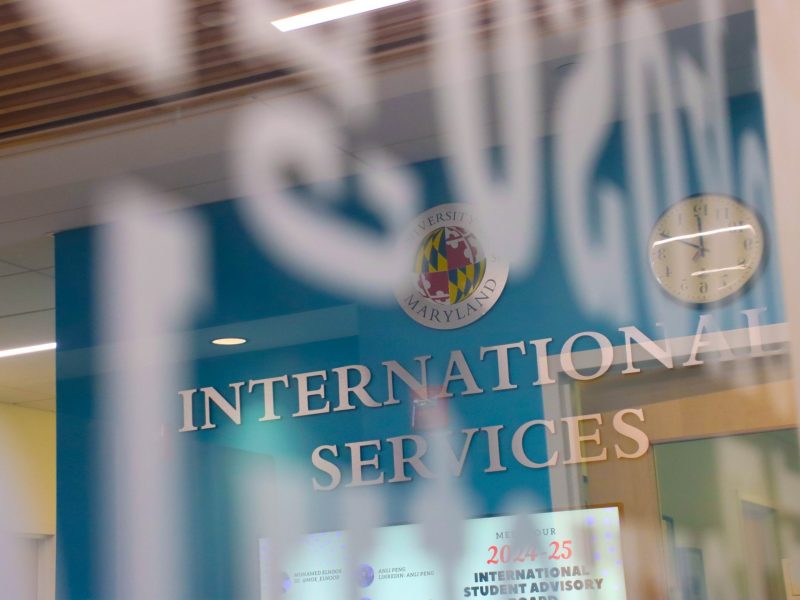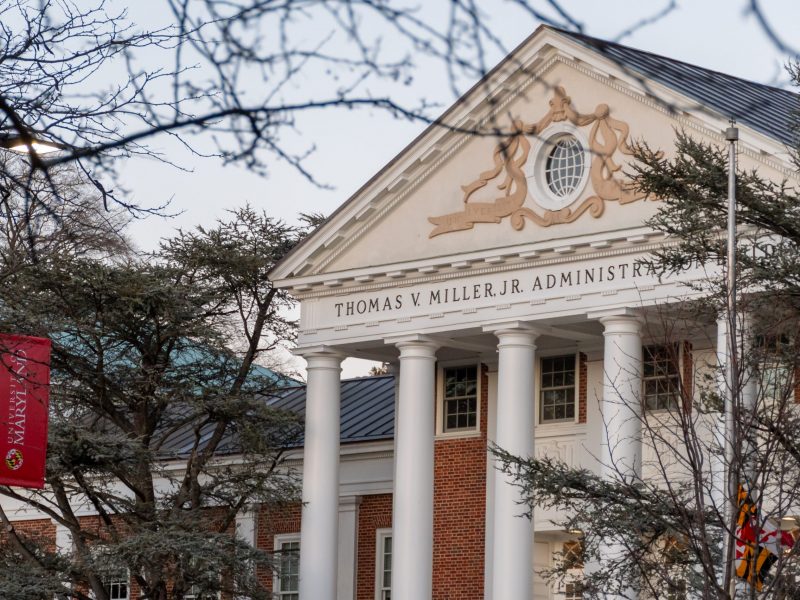By Jalen Wade
For The Diamondback
At a University of Maryland forum on Thursday, Brett Dashevsky, the president of the Snider Leadership Development Club, asked the crowd of about 70 attendees if freedom of speech should be regulated.
More than half of them raised their hands, much to the surprise of the panelists.
“What’s offensive to anybody is so subjective — do we really need a college nanny to tell us?” Gene Policinski, one of the panelists, said to the attendees at Van Munching Hall.
Policinski and other free speech advocates at the forum — titled “Challenge the Conversation: Freedom of Speech on College Campuses” — weighed the consequences of banning hate speech, promoting a diversity of opinions and making students feel safe on the campus.
[Read more: Sean Urbanski’s lawyers want hate crime charge to be dropped, citing First Amendment]
Policinski, the president of the nonpartisan free speech advocacy group Freedom Forum Institute, was joined by Erica Smith, the associate director of the College Park Scholars program Justice and Legal Thought, and Rajshree Agarwal, the director of the business school’s Ed Snider Center for Enterprise and Markets.
Dashevsky, a junior finance major, said the Snider Club chose the subject because it’s “interesting to students and faculty and hits close to home on Maryland’s campus.”
“It is a university — the point of a university is to explore ideas to challenge your beliefs to be exposed to things that are outside your community,” he said.
The forum comes a little more than a year after the University Senate discussed a campuswide ban of hate symbols. The proposal was nixed after university officials said it would violate the First Amendment.
[Read more: UMD finally released its long-awaited external diversity review — but it offers few details]
Policinski said hateful speech shouldn’t be banned outright.
“Hate lives on past any given speaker,” he said. “What’s more effective is really trying to address the hate, why would someone say that and try to find out through education and exposure.”
As the proposal was being discussed, Diane Krejsa, this university’s deputy general counsel and chief of staff, drew backlash for saying the school is “not a home,” and that students shouldn’t expect everyone to have “the same political views and the same social views and the same views on sexual orientation and transgender and whatever religion or whatever it is.”
After #UMDNotAHome trended on Twitter, Krejsa eventually walked back her comments, which she said had been misinterpreted.
Both Policinski and Agarwal said being surrounded by those with different views can give people a better definition of themselves and help them better understand where they stand on a given issue. Policinski found himself horrified when he listened to the speech of a racist evangelical.
“You never really know what you’re fighting for until you know what you’re fighting against,” said Agarwal.
Dana Cohen, a senior journalism major, welcomed the diversity of perspectives at this university. While she said the campus skews liberal — which doesn’t align with her own beliefs — she chose to come here anyway because “it’s more interesting.”
“Why would I want to go to a school that shares the same mindset as me?” she said. “It doesn’t challenge me, it’s not fun.”
There has been a slew of hate bias incidents on the campus dating back to last year, including a noose hung in a fraternity house kitchen and several swastikas drawn across the campus. This semester, 19 hate bias incidents have been reported, according to the Office of Diversity and Inclusion’s log.
A campus climate survey released in the spring found that many students of color didn’t feel safe on the campus. About one-third of the students surveyed said the administration’s response to hate bias incidents hasn’t been effective.
While Agarwal emphasized the importance of keeping students safe, she said that “the point of a university is to help you think and to help you sort through this world that we live in.”
During Agarwal’s time at a convent, nuns would impose corporal punishment, but often shared the adage “sticks and stones may break my bones, but words can never hurt me” when they did so.
“Now, that’s not quite true, because words can have a lasting impression on you, and they can damage,” she said of the adage. “However, that’s only if you allow yourself to buy into that. It still behooves you to think through what it is you’re hearing. All of that active thought is stifled if you have restrictions both externally and internally that you impose on yourself.”
Adam Rosenbaum, a freshman finance major, said freedom of speech is a critical issue because “America is built on speaking your mind.”
“I’m a big proponent of giving everybody the opportunity to speak,” he said, “and if you’re able to win people over, then more power to you.”



